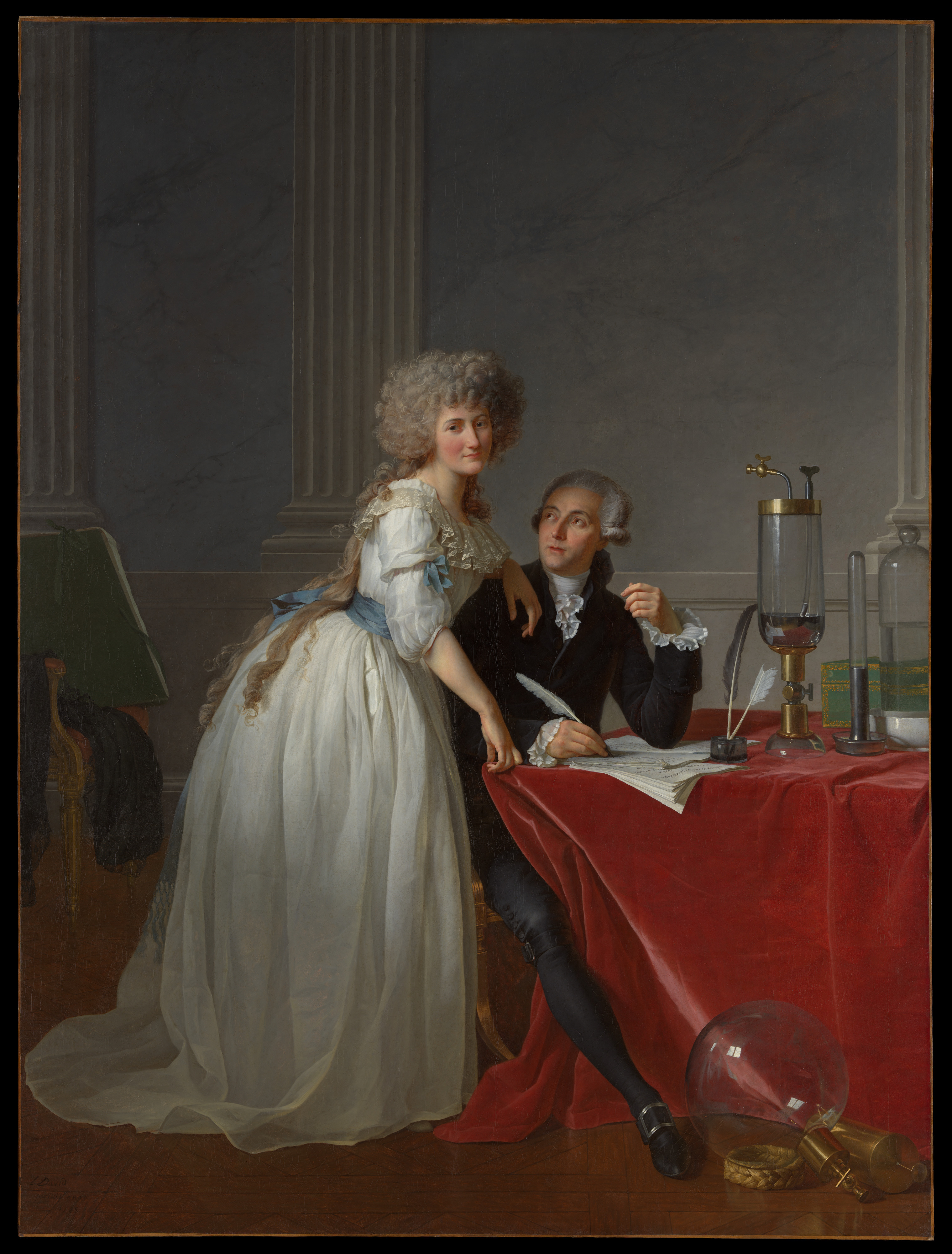New Elements Found in Lavoisier Painting
The Metropolitan Museum of Art just announced some interesting findings about Jacques Louis David’s portrait of Antoine and Marie Anne Lavoisier, which has been in its collection since 1977.
While working on the canvas, conservator Dorothy Mahon saw dots of red showing through in some unexpected spots while cracks in the red tablecloth on the right hinted at a pattern underneath.
Museum technicians collected images of the canvas using various technology: infrared reflectography, macro X-ray fluorescence mapping, and so on. That allowed them to identify where certain elements were present in the paint—most appropriate since Antoine Lavoisier gets top credit for starting the process of identifying the chemical elements.
One finding is that David originally painted Anne Lavoisier in a large, high-crowned hat of a sort fashionable in “the late summer and fall of 1787,” as the Met reported. However, by the time the couple paid for their portrait in December 1788, that style was literally old hat. David repainted the lady in powdered hair or a wig only.
The painter made another big change on the right, where a red cloth now covers a surface holding chemical apparatus. The painting originally showed an expensive wooden table bearing a classical decoration. Behind it was a bookcase full of bound volumes. For the final version, David painted over the bookcase and covered the table with a solid red cloth. Then he devoted that space to glass and bronze scientific instruments.
Thus, as originally composed, the picture showed at Lavoisiers at a luxurious table working on papers with records behind them. Those could have been documents related to Antoine’s job collecting taxes. Anne was up to date in fashion—which meant soon out of date.
By removing the hat and adding scientific tools, David shifted the picture’s emphasis to the Lavoisiers’ intimate partnership and scientific research, which is what we remember them for today.
The scientists involved in this analysis just published their work in Heritage Science. The Met summarized its staff’s findings in “Refashioning the Lavoisiers.” Hyperallergenic offers a slider image for comparing the finished painting to what’s under its surface.
TOMORROW: Mme. Lavoisier’s American connection.
While working on the canvas, conservator Dorothy Mahon saw dots of red showing through in some unexpected spots while cracks in the red tablecloth on the right hinted at a pattern underneath.
Museum technicians collected images of the canvas using various technology: infrared reflectography, macro X-ray fluorescence mapping, and so on. That allowed them to identify where certain elements were present in the paint—most appropriate since Antoine Lavoisier gets top credit for starting the process of identifying the chemical elements.
One finding is that David originally painted Anne Lavoisier in a large, high-crowned hat of a sort fashionable in “the late summer and fall of 1787,” as the Met reported. However, by the time the couple paid for their portrait in December 1788, that style was literally old hat. David repainted the lady in powdered hair or a wig only.
The painter made another big change on the right, where a red cloth now covers a surface holding chemical apparatus. The painting originally showed an expensive wooden table bearing a classical decoration. Behind it was a bookcase full of bound volumes. For the final version, David painted over the bookcase and covered the table with a solid red cloth. Then he devoted that space to glass and bronze scientific instruments.
Thus, as originally composed, the picture showed at Lavoisiers at a luxurious table working on papers with records behind them. Those could have been documents related to Antoine’s job collecting taxes. Anne was up to date in fashion—which meant soon out of date.
By removing the hat and adding scientific tools, David shifted the picture’s emphasis to the Lavoisiers’ intimate partnership and scientific research, which is what we remember them for today.
The scientists involved in this analysis just published their work in Heritage Science. The Met summarized its staff’s findings in “Refashioning the Lavoisiers.” Hyperallergenic offers a slider image for comparing the finished painting to what’s under its surface.
TOMORROW: Mme. Lavoisier’s American connection.


1 comment:
A really fascinating image.
M. Lavoisier is really showing leg in a manner--black stocking and tight silk breeches against a red background--that one could imagine a Vargas or a Petty painting in a very different context!
And the whole dynamic between Lavoisier and his wife is really curious. Is that barely-suppressed desire in his eyes? Or is he just startled/discomfited by the way she's leaning on him? Mme L's gaze, directed right at the viewer, is even more ambiguous...
A whole lot of subtext going on here, I think!
Post a Comment